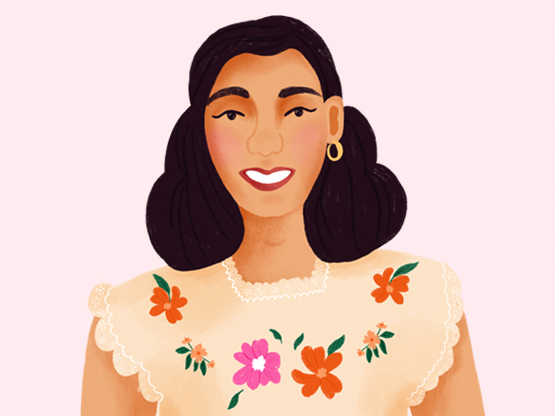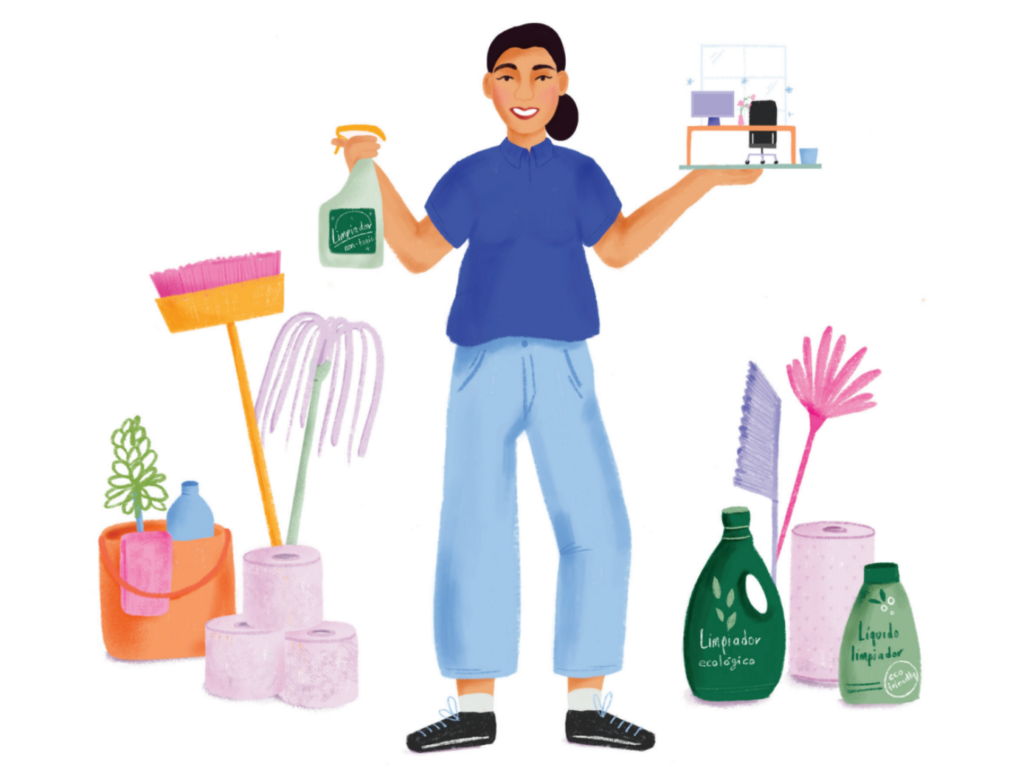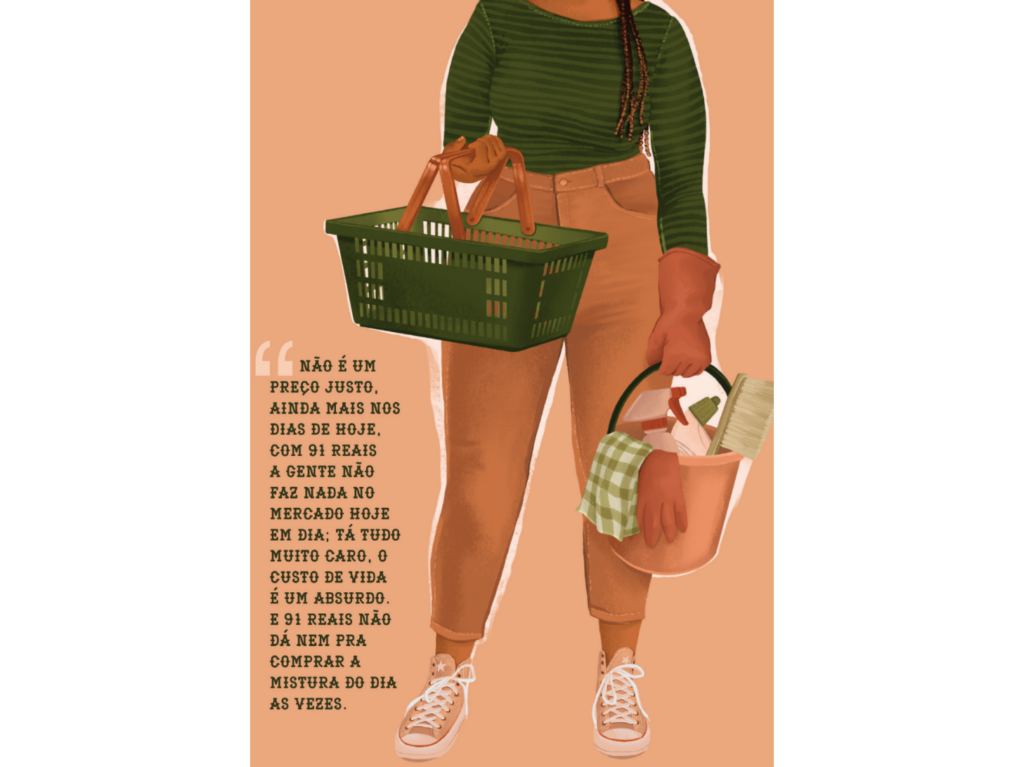
Our Re:Work podcast recently released a two-part series in partnership with Código Doméstico. Código Doméstico in the Flesh is a podcast produced by researcher and labor organizer, Kruskaya Hidalgo Cordero. It aims to expose working conditions for women hired as cleaners through apps in Central and South America, as well as the United States. At the heart of this show are deep listening and the fostering of collaborations to fight for the dignity of workers in the digital platform economy.
In this interview, we speak with Kruskaya Hidalgo Cordero about her current research, the importance of worker-led storytelling, and how podcasting and other collaborative media can serve as tools for advocacy. Hidalgo’s work is informed by her involvement with the Platform Observatory—a collective initiative that brings together trade unionists, researchers, and labor activists across Latin America to better understand and advocate for workers in the platform economy. Through projects like Código Doméstico, she is amplifying the voices of domestic workers across Latin America and beyond.
This interview has been edited for length and clarity.
What kinds of issues are you currently exploring with your research?

For the last seven years, I have been researching various sectors in the platform economy and their intersections with gender and migration. In 2022, I started exploring the impact of algorithmic systems on the care economy which ultimately led me to Código Doméstico in the Flesh, a research report and corresponding podcast.
We recently translated the podcast to English in collaboration with Re:Work, the UCLA Labor Center’s podcast. Amid today’s challenging international climate, marked by the regression of labor rights and attacks on the labor movement, this podcast collaboration feels like a powerful act of solidarity.
I have also been exploring other areas of the care sector within the platform economy. In all of these sectors, you are seeing precariousness. Colonial capitalism is embedded in all economies, but it is especially predatory in the platform economy. There are extreme violations of labor rights and privacy, including the policing, controlling, and monitoring of care workers’ movements and duties.
What inspired you to share your research through podcasting?
My research focuses on decolonial and collaborative feminist perspectives. I wanted to make it accessible to different audiences and also challenge how we produce knowledge. It was important for me to make this a space of collective authorship with the workers.
Anytime that I’m writing a paper or releasing a project, I share all the stages of the project with the workers involved so they have the ability to control how their narrative is being told. We decided that a podcast will be a good way to disseminate the stories because not everyone has the time to read the research paper. The podcast was born out of necessity—workers wanted to engage with the research in a way that felt accessible and relevant to their lives.
We have also produced other forms of the research through booklets and art, because I’m committed to finding feminist and politically engaged ways of sharing knowledge. I’m exploring different mediums—like podcasts, booklets, illustrations, or graphics—that can help workers engage with the material on their own terms. Because at the end of the day, I recognize my responsibility within the labor movement as a labor scholar committed to collective struggle. If my research stays confined to academic circles and citing publications, it risks being disconnected from the very movements it seeks to support. Workers need resources for everyday advocacy. That’s why I always try to produce advocacy tools beyond the academic paper.
What inspired you to co-found the Platform Observatory, and what has the experience been like?

I knew about the precariousness of the platform economy sector because they were working even before the COVID-19 pandemic without any guarantee of labor rights or social security. The pandemic made everything worse and platform workers became essential workers. The hashtags used during this time to “stay at home” were just another way to show the necropolitics of the States: different kinds of human beings, first class and second class. The first class were the ones that could stay at home because they worked online or they had money. But what about those in the informal economy, the ones who had to be out on the streets every day just to survive?
I felt an urgency to do something and that was my first motivation to create a platform observatory with colleagues from different areas. I was one of the researchers, but there were illustrators, a podcast producer, and a lot of women working in other areas of creating media. For us, the platform observatory was this space for trying to make the situation visible and trying to take action to help demand support for platform workers.
Since the beginning, this was a multi-interdisciplinary group of people that was trying to focus on research for this cause, research for advocacy, research for workers, and for creating unions. This was not academic or linked with an institution, but rather a ground-up and very challenging process starting from zero. As activists, we had to figure out the logistics of how do you connect with workers? What activities need to be organized and how do you secure funding? The Platform Observatory is not a place where we have a salary; we all have other jobs and sustain the Observatory in our free time. We were the first organization in Ecuador that was doing that, and one of the first in Latin America.
What do you hope that listeners will take away from listening to Código Doméstico in the Flesh?

One of the core parts of Código Doméstico in the Flesh is understanding that not only are these women warriors of their own life, but also experts by experience. There is nobody that knows more about the care economy in the platform sector than workers like Jessi, Roxy, Gisela, and Paola, and that’s why the research, the booklet, the graphic stories, the web page, and the podcast were created through their lens. I was simply someone to facilitate the space, to try to create materials that help them in their own fight in the labor movement, and also disseminate information on what’s happening.
I hope that when you listen to the podcast, you’re taking their stories from it. Every one of these women are demanding very clear things that need to change in the platform economy and in care work apps. There are government proposals for regulation reforms, law reforms, academic panels and so on, but the worker’s input is missing. Workers have very concrete proposals of what can and needs to change. In my experience, they want these apps to change so they can obtain labor rights and dignity.
The podcast is a way to make visible what’s happening. And this is a reality that is very shocking, is very precarious, and is violent, but there is also a lot of resistance there. I think that the podcast made it clear–these women are organizing. These women are finding ways to make this better. These women have very clear demands, and despite the hardships, are very powerful.



